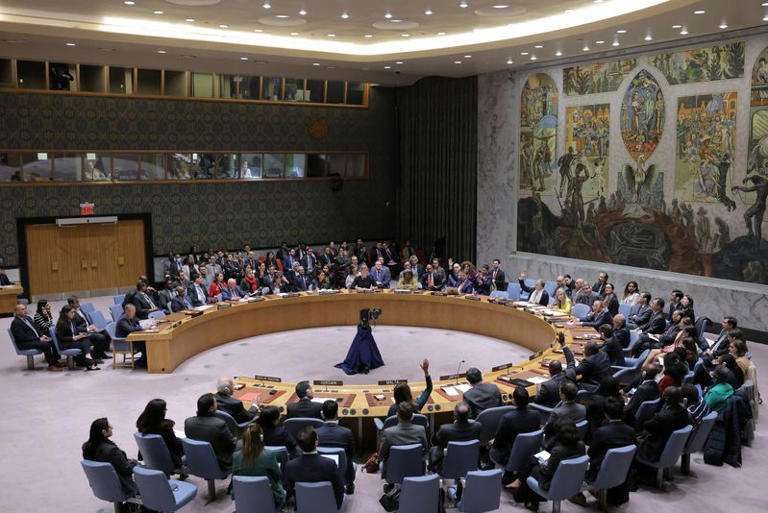In the complex arena of global diplomacy, it is not new for the UN Security Council to pass resolutions on issues pertaining to member states, especially to ensure the peaceful settlement of international disputes and eliminate threats to international peace and security.
These resolutions stand as formidable instruments designed to address and resolve pressing international issues and are intended to be authoritative directives shaping the course of international relations.
However, the true litmus test lies not just in their formulation and adoption but in their effectiveness; measuring the extent to which the nation(s) concerned translate the ideals into tangible actions that foster peace, security, and justice on a global scale.
The ongoing war in Gaza Strip calls for a Security council collective response and after four failed attempts, the UN Security Council has finally passed a resolution on the Israel-Hamas war on Wednesday, November 15, 2023.
It was adopted by 12 votes in favour, zero against and three abstentions; Russia, the United States and the United Kingdom.
The resolution, introduced by Malta calls for “urgent and extended humanitarian pauses and corridors throughout the Gaza Strip” to allow for aid delivery and medical evacuations.
It also calls for “corridors throughout the Gaza Strip for a sufficient number of days” to safeguard civilians, particularly children, ambassador Vanessa Frazier told the Council
The resolution listed fuel as among the items that must be allowed to be delivered “unhindered” and it requires that the UN Chief to give a report on its implementation at the next meeting of the Security Council concerning the Middle East.
The resolution made no mention of a ceasefire, it didn’t refer to Palestinian group Hamas’s attack on Israel on October 7 and it omitted Israel’s retaliatory air strikes and ground offensive in Gaza.
Although UNSC resolutions are binding on all member states, there are many of them that Israel has failed to comply with.
For instance, in 2016, Israeli Prime Minister, Benjamin Netanyahu refused to recognize a UN Security Council resolution demanding a halt to Israeli settlement activity on occupied Palestinian territory.
At present, the odds that Israel will ignore the resolution are high, atleast until its needs are met. Israel’s Ambassador to the UN as well as the Israeli Foreign Ministry were quick to drive this message home.
Gilad Erdan, Israel’s Ambassador to the UN, was quick to respond in an X post that the resolution “is disconnected from reality and is meaningless.”
He insisted that his country is acting lawfully, saying, “Regardless of what the Council decides, Israel will continue acting according to international law while the Hamas terrorists will not even read the resolution at all, let alone abide by it.”
“It is unfortunate that the Council continues to ignore, not condemn, or even mention the massacre that Hamas carried out on October 7, which led to the war in Gaza. It is truly shameful! Hamas’s strategy is to deliberately deteriorate the humanitarian situation in the Gaza Strip and increase the number of Palestinian casualties in order to motivate the UN and the Security Council to stop Israel.”
Gilad Erdan
He added, “It will not happen. Israel will continue to act until Hamas is destroyed and the hostages are returned.”
The Israeli Foreign Ministry issued a statement to local outlets in Israel.
“Israel calls on the Security Council and the international community to insist on the release of all Israeli abductees quickly – as the resolution stipulates. We expect the Security Council to unequivocally condemn Hamas and address the need to create a different security reality in Gaza. There’s no room for prolonged humanitarian truces as long as 239 abductees are in the hands of Hamas terrorists.”
Israeli Foreign Ministry
A Little Added Pressure From U.S
U.S, Israel’s staunch ally could play a role for Israel to comply with the resolution. One cannot tell if the resolute Netanyahu will cower under pressure.
Knowing that U.S allowed this resolution to go through, even though it could have used its veto power, may sway Israel a bit.
Human Rights Watch’s UN director, Louis Charbonneau said that, “that the U.S finally stopped paralyzing the Security Council on Israel and Palestine so this resolution on the plight of children in Gaza could move forward should be a wake-up call to Israeli authorities.”
“Global concern, even among [Israel’s] allies, is strong,” he said.
Omar Shakir, HRW’s Israel and Palestine director, said the “world must act to prevent further mass atrocities”.
READ ALSO: UN Urged To Take ‘Immediate’ Action On Aid For Gaza



















